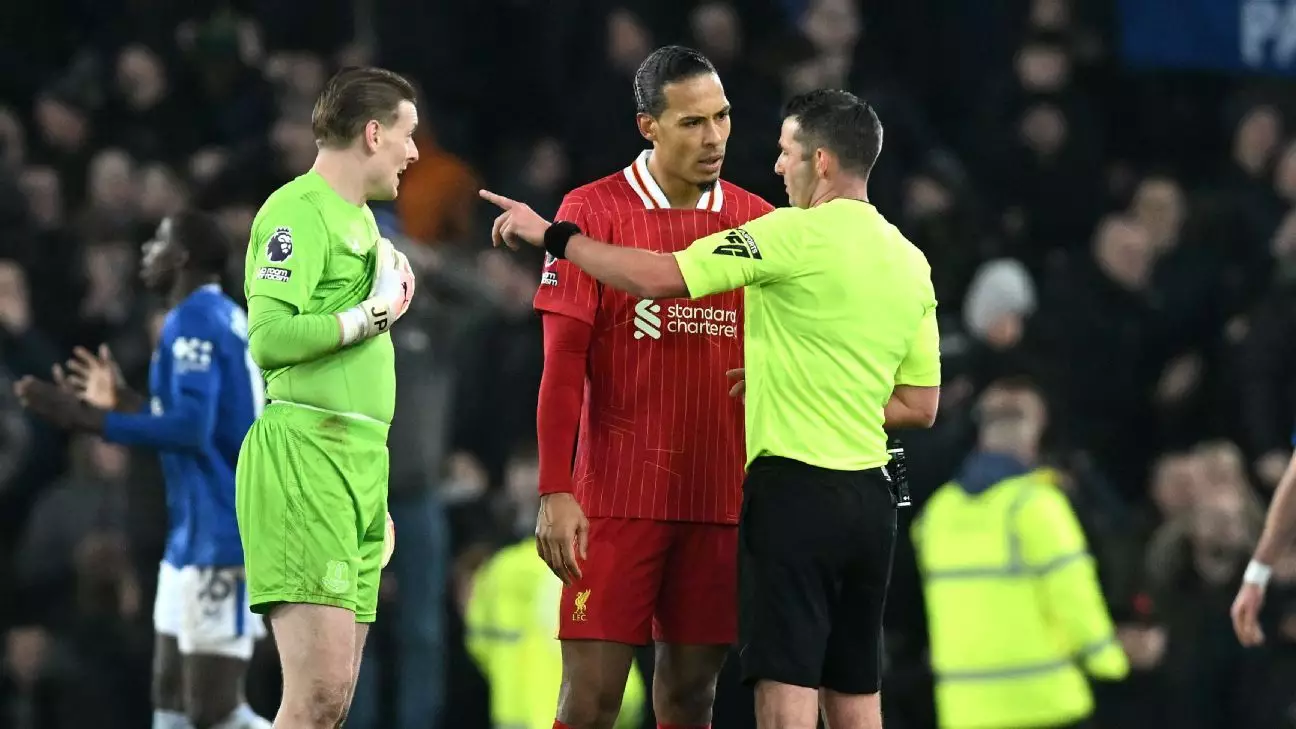The Merseyside derby on Wednesday night between Liverpool and Everton will be etched in the memories of fans for more than just the two-all draw. As the final whistle blew, the exhilarating atmosphere at Goodison Park transformed into chaos and contention, culminating in a confrontation that saw four red cards issued post-match. Liverpool’s captain, Virgil van Dijk, was quick to express his dismay at referee Michael Oliver, alleging that he “lost control” of the game when emotions boiled over in the aftermath of Everton’s dramatic equalizer.
The game was punctuated by moments of brilliance, especially when Everton’s defender, James Tarkowski, scored a spectacular volley deep in stoppage time, shifting the balance and escalating the intensity within the stadium. The emotional crescendo reached its peak as Everton fans erupted in celebration, inciting a confrontation between players and an unfortunate brawl between the teams’ benches.
In what was expected to be a match of skill and strategy, the players found themselves entangled in heated exchanges fueled by adrenaline. Curtis Jones, representing Liverpool, challenged Abdoulaye Doucouré after the latter provoked the crowd. This initiated a cascade of reactions, leading to both benches becoming embroiled in the melee, and stewards and police having to intervene. The decisions made by Oliver during this tumultuous time sparked controversy, with red cards being issued to both Jones and Doucouré, further intensifying the already fraught atmosphere.
Liverpool’s head coach, Arne Slot, also received a red card for his vocal protests, leaving his team without a leader for the post-match analysis. His absence underscored the emotional toll the game exacted on the managers as well.
In reflecting on the match, van Dijk pinpointed a broader concern regarding officiating. His assertion that the referee’s failure to maintain control led to the debacle raises important questions about the standards of officiating in high-stakes matches. It begs the larger conversation about how referees can better navigate the charged emotions of derby fixtures while ensuring a fair and just game plays out on the pitch.
While van Dijk acknowledged that both teams must adapt to the intensity, the essence of competitive spirit was undoubtedly challenged as tensions flared. Emotionally charged dashes of animosity within such a storied rivalry necessitate a prudent approach from match officials to keep the excitement from spiraling into chaos.
Everton’s manager, David Moyes, characterized the chaos as a fitting conclusion to the final derby at Goodison Park, although he did not dwell on the scuffle itself. He emphasized that while the game may not have been the cleanest spectacle, it was an essential display of the fierce spirit of rivalry that Merseyside derbies are known for. The palpable tension and the resulting confrontations may have transformed what could have been a more traditional football match into a gritty representation of local pride.
As both teams look forward to the remainder of the season, the aftermath of this derby serves as a reminder of the intricate dynamics between sport, emotion, and the unpredictable nature of competition. Fans at Goodison Park witnessed not just a football match, but a spectacle that encapsulated the raw passion and unpredictability that Derbies are renowned for.


Leave a Reply